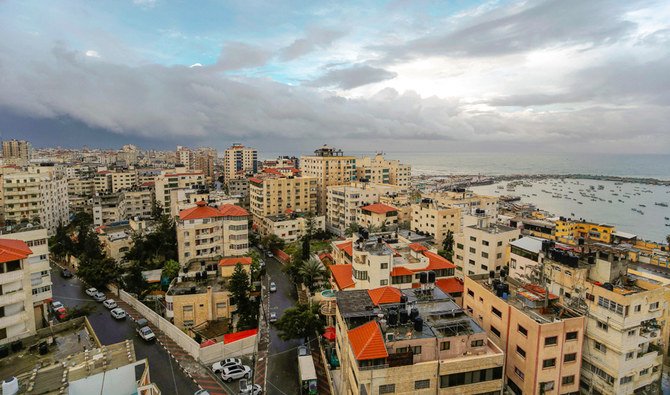
- ARAB NEWS
- 26 Apr 2024

Hazem Balousha
GAZA CITY: Ramadan is a way for struggling Palestinians in the Gaza Strip to earn an income and at the same time bring a festive touch to the month of fasting.
The small, ad-hoc enterprises are a temporary respite from the dire economic and humanitarian conditions that people endure due to political turmoil and a 14-year Israeli siege.
Faraj Odeh has held many jobs since he graduated from university six years ago but, during Ramadan, he sells a famous type of pastry.
Qatayef is an Arab dessert that is commonly served during the holy month. It is a sweet dumpling filled with cream or nuts, sometimes but not always in a crescent shape. It is like a stuffed pancake, or even cannoli.
“It is a special Ramadan dessert and provides us with a good income,” the 28-year-old Palestinian told Arab News.
Its low price and popularity with all sections of society make it a Ramadan staple. The average price per kilo of unstuffed qatayef is about $2.50.
Mohammed Al-Soussi was packing away empty bottles just before iftar at a small trolley in a well-known Gaza market. He sells kharoub juice (carob), which can taste like cold drinking chocolate but has much more nutritional value and many more health benefits.
“The sale of kharoub juice this month is a source of livelihood for me and my family, especially as the demand for these drinks increases during the month of Ramadan,” he told Arab News.
Al-Soussi, who is 45 and a father of six, said that selling drinks was far better than sitting at home without work or throwing oneself into the sea in the hope of migrating to Europe.
His daily profit was around $20, which was enough to provide his family with basic needs.
“Ramadan provides an opportunity to unemployed Gazans to earn some money,” he added. “They use it to sell Ramadan-related products that range from food, beverages, toys and lanterns.”
Abu Mohammed Al-Barqouni was in the Sousse vicinity, busy decorating his small shop with lanterns of different shapes and colors. The lanterns are hugely popular among children.
“I hope to bring happiness to all children, but some parents come and ask about the prices and don’t buy because they can’t afford it,” he told Arab News.
Lantern prices range from 10 to 20 shekels ($2.84 - $5.69) for an average size, while a small lantern costs between five and seven shekels. “Despite the low price of lanterns, the sales fluctuate due to the deteriorating economic conditions of the majority of people in Gaza,” he said.
Al-Barqouni said he could still put food on the table for his family despite a drop in sales.
A typical Arab iftar table is incomplete without pickles and many Gazans sell pickles during this month as the sale of this product generally soars.
“We prepare to work in the month of Ramadan several months before,” Mahmoud Abu Hamid, who has been selling pickles for 24 years, told Arab News. “We prepare pickles of pepper, eggplant, cucumbers, carrots, lemons, macaroni and olives, and put them in sealed drums to keep them as long as possible. And as Ramadan is announced we go from the morning of the first day of Ramadan to popular markets and start selling.”
He said sales increased after Asr prayer, and that the wealthy and those with large families bought a kilo of pickles ranging in price from 25 to 30 shekels. Some bought small amounts of pickles for just a few shekels, which would only last a day, he added.